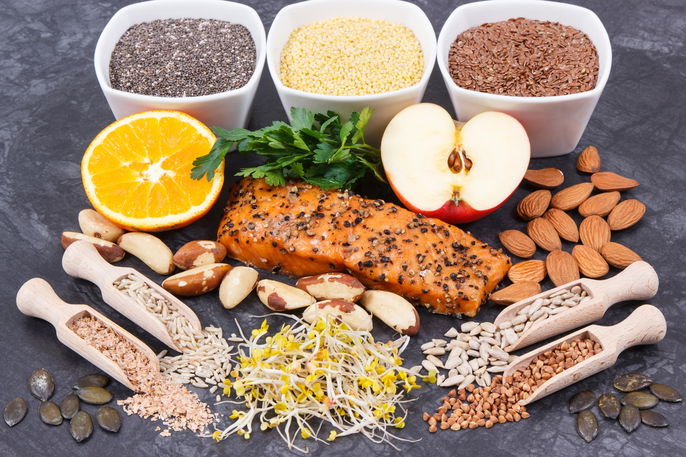A hypothyroidism diet incorporates foods such as seaweed, Brazil nuts, oranges and eggs. These foods contain nutrients such as iodine, fiber, antioxidants and healthy fats, which are necessary for the proper functioning of the thyroid.
Foods such as broccoli, turnips and cabbage, on the other hand, should be eaten in moderation, as they contain glucosinolates. These compounds can decrease the production of thyroid hormones, which can impair normal functioning of the gland.
In addition to diet, people with hypothyroidism should also be monitored by an endocrinologist. The doctor may prescribe medication to regulate thyroid function and reduce associated symptoms of the disease, like tiredness, weight gain and dry skin. Learn more about other symptoms of hypothyroidism and what can cause it.

What to eat
In a hypothyroidism diet, it is essential to maintain a balanced and healthy diet. You should prioritize foods that contain the following nutrients:
- Foods with iodide, such as seaweed, iodized salt, seafood, milk and dairy products.
- Foods that are high in zinc, such as beef, walnuts, chestnuts and Brazil nuts.
- Foods that contain selenium, such as eggs, meat, seafood, mushrooms, whole grains and Brazil nuts;
- Foods that are high in copper, such as cocoa, peanuts, almonds and oats;
- Foods that are high in vitamin A, like beef liver, eggs, dairy, pumpkin, carrots, squash, peaches and papaya
- Foods that contain amino acids, such as meat, fish, vegetables, nuts and seeds
- Foods with antioxidants, such as cherries, pumpkin, cashews, papaya, strawberries, tomatoes, avocados and oranges. Check out more sources of antioxidants and how to consume them.
- Natural herbal infusions, like gentian tea
It's also important to include whole grains in your diet, such as whole wheat bread, whole wheat pasta and brown rice, as these foods are high in fiber, which is important for keeping you full and preventing weight gain.
In addition, you are also advised to exercise regularly to improve mood, physical and mental disposition, as well as speed up the metabolism.
Foods to avoid
Some foods that can cause weight gain or interfere with the production of thyroid hormone include:
- High-sugar foods, such as cakes, sweets, soda, ice cream, cookies.
- Refined grains, such as white bread, white pasta, white rice.
- Foods rich in glucosinolates, such as broccoli, cabbage, turnip, radish, cauliflower and Brussels sprouts.
- Processed foods, such as smoked meats, margarine, ready-made sauces and dressings, fast food and packaged snacks.
- Soy and its derivatives, such as soy milk, tofu, tempeh and soy oil.
It's important to note that these foods don't have to be completely excluded from the diet. You should, instead, avoid excessive and frequent intake of these foods.
Meal plan
The following table outlines a sample 3-day meal plan for hypothyroidism:
This meal plan is just an example of what you can eat during a hypothyroidism diet, which can vary according to your current weight and health status. You are advised to to consult a registered dietitian for a full assessment and an individualized diet plan.
Other recommendations
It is important to maintain other lifestyle habits in addition to diet to keep symptoms under control. Some suggestions include:
- Eat 3 main meals and 2 to 3 snacks a day
- Consume 2 to 2.5 liters of water
- Exercise regularly, at least 3 times a week for 1 hour;
- Increase fruit and vegetable consumption to around 5 servings per day
- Prepare food in the oven or grill, avoiding fried foods
- Avoid consuming simple sugars and foods rich in fat
Be sure to speak to your doctor to determine the most appropriate treatment plan for you.
Can you gain weight with hypothyroidism?
Hypothyroidism can slow down your metabolism, which can lead to weight gain in some people who have this disease. However, weight gain is usually only between 2 and 4 kg and, the disease is not the main cause for being overweight or obese.
Therefore, in order to avoid weight gain, you should maintain a balanced and healthy diet, as well as exercise regularly, as these factors influence weight gain more than hypothyroidism itself.






























